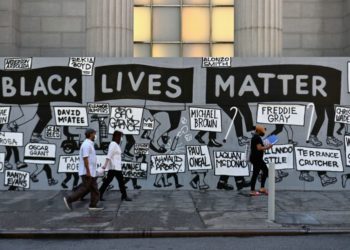The heart-wrenching massacre at the local newspaper in Annapolis, Maryland last Thursday has become the latest in a barrage of shootings plaguing the United States. It’s also become the latest in a national discussion on free speech and the role of journalists in the U.S. and around the globe.
Just days before the shooting, professional agitator Milo Yiannopoulos told reporters that he couldn’t “wait for the vigilante squads to start gunning journalists” (although he later claimed it was simply a joke). In the hours that followed the tragic mass shooting, reporters attempted to engage with President Donald J. Trump, who ignored their questions and waved them off. He officially responded the following day, saying that journalists are like all other Americans and shouldn’t be fearful to do their jobs. Of course – for those paying attention – this statement defies any of his easy-to-find attacks on journalists as individuals and journalism as an institution. As yet another day passes, we watch, gob-smacked.
This past week has been devastating to Americans for many reasons. In reality, it was par for the course. Trump is a chaos president. He thrives on drama, turmoil, and the thrill of the deal. If we have learned anything, it is that he will not change. As a candidate, he did not change. As a president, he did not change.
What needs to change is us. We must hold ourselves and each other accountable to defend press freedom, to protect journalists, and not to sink into the narrative that everyone is out to get everyone else. We must not be sidetracked by the shiny ball that is a tweet, troll, joke, meme, gif or any other distraction. Importantly, though, it’s not just distraction; it’s motivated reasoning. Ever have that feeling when you see a funny meme that agrees with your point of view, and you think, “Oh snap! That’s a good one!” But find one from the other side and – aghast! – post on social media how disgraceful it is? That’s motivated reasoning.
We are motivated to find information that fits our existing attitudes and beliefs. Because of motivated reasoning, we end up “knowing” different facts about the world based on who we trust, which is an increasingly small number of outlets.
Ultimately we are responsible for taming those motivations and becoming literate in a world that is increasingly overloaded with both good and bad information. While algorithms and social networks make it easy for us to sink into narrower and narrower echo chambers, we can’t just blame them for the situation we are in. We are responsible for seeking out truth and celebrating those who risk their lives to report it.
If you pay attention to conservative sources, you might believe that the flood of mass shootings lately is because of mental illness. If you follow liberal sources, you might think it’s the Republicans’ fault for kowtowing to the NRA. If you dare go beyond traditional partisan voices, you may find yourself deep-diving into the unhinged conspiracy theories of Alex Jones, radio host who’s website Infowars.com contains fake news and conspiracy theories. Jones claims that the victims of shootings are “crisis actors.” Or perhaps you stumbled on the “incel” subreddit, where an “involuntary celibate” argued that because women don’t like him, he has the right to inflict harm on others.
So is it any surprise that a president who thrives on blame, chaos, and diverting attention would capitalize on our tendency toward motivated reasoning? That drives our fear that the real world isn’t what it seems? That the “evil” media are out to mislead us? We need to put down our devices in order to see the humanity in each other. We need to get out and march, protest, meet others who agree with us and others who disagree with us. If we don’t, all we will see is a mysterious enemy on the other side of the screen.
We must look at each other as we see ourselves in the mirror: flawed individuals who are just trying to make it through the day as we are pelted with one piece of bad news after another. You’re exhausted, right? So is your neighbor whose political yard signs drive you crazy. So is your father-in-law who sends you those emails that are easily debunked with one look at snopes.com. So is your child’s teacher who has to listen to 5-year-olds giggle about how “Trump calls women pigs,” and then prohibits them from talking about politics (yes, this actually happened recently in my daughter’s class).
The horrifying shooting in Annapolis is not the result of President Trump alone, even if he does call journalists the “enemy of the American people.” It is not the result of viral attention-seekers like Milo Yiannopolous, who flat-out called for killing journalists, joke or not. There are myriad reasons for the gun violence we see in the U.S. today, but when it comes to its relation to the institution of journalism, we must look at ourselves in order to understand the rampant animosity that seems to have taken over the nation.
The violence with which we are capable of inflicting upon each other has been demonstrated over and over again throughout our history. I don’t need to give you the examples; you’ve read about them in your textbooks.
Nothing connects us all to each other more than the pain and joy that constitute the common human condition. Astronomer Carl Sagan provided an insightful response to this conundrum in “The Demon-Haunted World.” He argued that all humans are fearful, anxious, and uncertain, and this is precisely why we look to other institutions and people – credible or not – to help us feel more certain, more stable. But he also calls for us to feel “compassion for kindred spirits in a common quest.” We must strive to see beyond our own biases, to reject claims of bias in an attempt to persuade and to understand that we are all trying to figure out what it is we are doing here, on this earth, in this time.
We’ve been here before, but we don’t need to repeat the same mistakes. The next time you open your device and become enraged upon seeing the “evil media” on your screen, look closely – you may see your own reflection. We all have the capacity for being a monster or for making things better. I choose better.
Disclaimer: The views and opinions expressed here are those of the author and do not necessarily reflect the editorial position of The Globe Post.






















